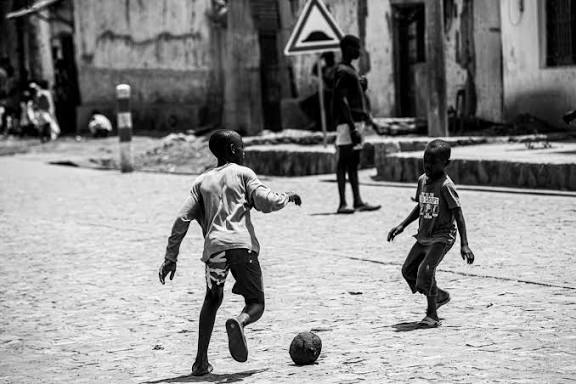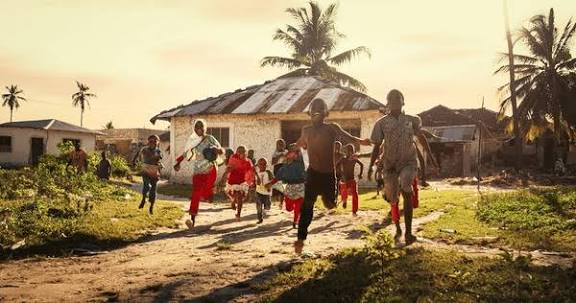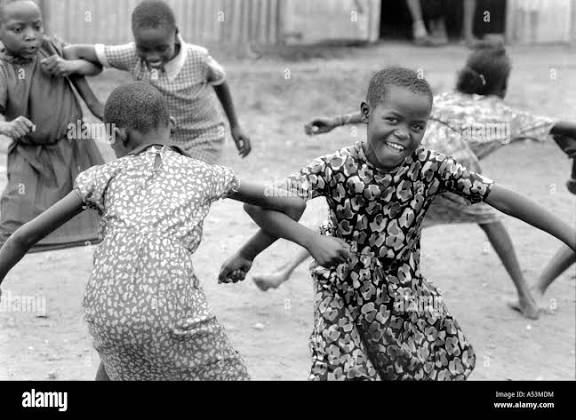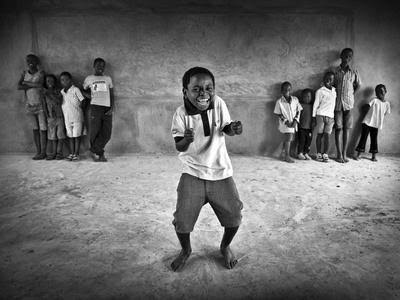Why Kids No Longer Gather in the Cool of the Evening

Introduction
There was a time when childhood lived on the streets, not on screens.
The sun would slip behind the rooftops, the air cooler, the day’s dust still clinging to bare feet. And like a clock with no alarm, children would pour into the streets, yards, or open fields, without calls, without texts, without reminders. It was a ritual. Boys rolled out old footballs patched with tape; girls drew chalk lines for suwe (hopscotch) or clapped hands in rhythm for skipping games. The evening belonged to laughter, to games, to storytelling.
But now? The streets are quieter. The laughter has quietly dimmed over the years. Children sit indoors, absorbed by glowing tablets, consoles, or TikTok feeds. The “cool of the evening”, once sacred and crucial to childhood bonding, is now just another hour lost to the digital world.
The Gathering Without Invitations
What made those evenings so special was their simplicity. No one sent WhatsApp messages to confirm playtime. No one dialed a number to remind anyone else. Everyone just knew. At 3:30 or 4 p.m., after closing from school, after chores, after errands, after the day’s bustle, children would appear, one after the other. Some barefoot, some with dust-stained slippers, others clutching makeshift toys built from tins or broomsticks. It wasn't the appearance that mattered, it was the fun that going to be enjoyed that evening that was the expectation of every child that evening.

It wasn’t about having. It was about being. Even the poorest child carried wealth in laughter. Even the strictest parent, after warnings about homework, would eventually let their child sneak out. The gathering was a rhythm of its own and it was anticipated by all and sundry. A child who didn't go out was cross checked to see if they were sick and needed attention because gatherings like this were an unwritten daily activity.
Compare that with today: children’s schedules are managed like corporate calendars, dance classes, coding boot camps, private lessons. The spontaneous magic of “see you outside after dinner” is nearly gone.
Games of the Past: Football, Suwe, and Secret Codes
Every child had a role. For boys, the football game was king. It didn’t matter if the ball was half-flattened or sewn back together; it was a passport into glory. On dusty pitches, heroes were made. A single goal could crown a child “Ronaldo” or “Okocha” for weeks.
For girls, hopscotch, skipping ropes, and clapping games filled the evening. Chalk lines on concrete, or stones arranged in circles, became arenas of joy. Songs turned into rules, laughter into the soundtrack. Boys too had their own coded games, wrestling matches, adventure chases, even mock “police and thief” games that turned alleys into action scenes were the order of the day.
There was no leaderboard, no “achievement unlocked” badge, no algorithm awarding points. Only childhood quarrels which were always settled, bruises, cheers, and the pride of being known in your street for speed, strength, or skill.
The Communal Cinema
And then, there was the magic of evening movies. In some neighborhoods,there was always that one family with a TV that always became the cinema of the street, because of the epic movies and series you could get to watch in their houses. Children crammed into sitting rooms, some peeking through windows, to watch wrestling, Bollywood blockbusters, or foreign series like Super Story.
The tension of being late was universal: torn between staying to finish the episode or rushing home before your mother’s call rang through the night. Many of us remember sprinting home with fear and laughter tangled together, hoping our parents’ discipline would soften once they saw our wide-eyed excitement.
It wasn’t just about the story on the screen; it was about sharing it. When everyone talked about the same episode the next day, friendship deepened. So everyone would gather to watch, so they wouldn’t miss out in discussions. Today, children binge alone, each on their own device, no shared commentary, no collective memory, everyone distanced by the digital age which was supposed to pull us together.
When the Street Raised You
Evening play was never just about fun. It was social education. The street raised children as much as families did. Older kids taught younger ones the rules. Disputes were settled with fairness, or sometimes with playful stubbornness. Neighborhood “aunties” kept an eye out, their voices carrying warnings that parents didn’t need to repeat.

You didn't dare to misbehave as a child in this playing grounds, as the strong hands of discipline would definitely get to you and the news of your misbehaviour would get home to your parents faster than the flash you see in a DC comic movie.
In those moments, children learned from the community how to share space, how to negotiate, and how to compete without breaking bonds, while being on the best of terms with everyone. The street was a classroom, one where resilience, courage, and humility were taught without textbooks.
The Silence of Today
Walk down many streets now, and the silence is heavy. Gates are locked, parents are fearful, and children remain indoors. Safety concerns, urbanization, and the omnipresence of technology all play their part. The evening ritual has been replaced by Nickelodeon, Netflix, or endless YouTube videos.
Where once there was a choir of laughter, there is now the hum of generators behind compound walls. Where once there were games, there are now screens. Childhood has been privatized.
It’s easy to dismiss this as “just nostalgia,” but the loss is real. Today’s children may have more comfort, but they lack certain experiences that shaped generations before them:
The thrill of spontaneous friendship, making allies on the street, not through friend requests and waiting for someone to reply to their text.
The balance of fear and freedom, sneaking one more game while glancing over your shoulder for your parents was a different thrill entirely.
The texture of play, running until your breath catches, scraping knees on gravel, laughing until dusk swallows your voice.
The art of storytelling, hearing exaggerated tales from older kids, not watching filtered clips online.
Screens cannot replace that raw humanity and connection, a child who grows up indoors may never know the communal rhythm of play, the shared identity it builds. This child may never grow fully to bond with others easily.
The Bigger Picture
Technology isn’t the sole villain here. Cities grew busier, safety became a real worry, and parents grew protective of their children and kids under their care. But technology amplified the gap. Why risk the street when you can scroll TikTok indoors? Why gather outside when a video game offers endless excitement?
But here’s the truth: play is not just about entertainment. It’s about imagination, resilience, and belonging. And when children lose that, societies lose something too. A generation that doesn’t know how to gather may also struggle to build community as adults.

So what can be done? We can’t rewind time. We can’t switch off the internet. But we can find balance. Parents can carve time for outdoor play. Communities can reopen playgrounds, create safe spaces, and encourage neighborhood bonding. Schools can blend digital literacy with cultural games.
We don’t need to abandon Netflix and TV series, but we need to remember that sometimes, the best “episode” is the one acted out on dusty streets by barefoot children and while your child doesn't need to literally barefooted, the cool of the evening can still return, but only if we choose to make it part of our rhythm again, because those same experiences shaped many parents today who have stories to share to their children about when they were growing up.
Conclusion: Holding On to Innocence
The memory of those evenings lingers, the smell of dust after football, the laughter of friends in twilight, the thrill of sneaking into a neighbor’s house to watch a film. These were not just pastimes. They were foundations. They taught joy, resilience, and community in ways no app ever can.
So when we say “kids no longer gather in the cool of the evening”, it is not just an observation. It is a warning. Childhood without that innocent freedom risks becoming too private, too digital, too shallow.
And maybe, just maybe, if we revive those simple rituals, of playing outside, of laughing together, of running barefoot into the sunset, our children will grow up not just entertained, but connected. That is what make human connection to be real and really felt.
Because in the cool of the evening, life itself once gathered, and it was beautiful.
Recommended Articles
IShowSpeed Takes Africa by Storm: Unforgettable Viral Moments from His Epic Tour!

Internet personality IShowSpeed embarked on a 28-day, 20-country "Speed Does Africa" tour to trace his heritage and show...
Global Recognition! Davido & Sanwo-Olu Set to Be Honored at Prestigious MIPAD 2025 Awards

The Most Influential People of African Descent (MIPAD) is bringing its renowned awards ceremony to Lagos, Nigeria, for t...
James Van Der Beek's Silent Killer: Dismissed Colon Cancer Symptoms Exposed

Actor James Van Der Beek's passing from early-onset colorectal cancer highlights a concerning rise in the disease among ...
You may also like...
When Sacred Calendars Align: What a Rare Religious Overlap Can Teach Us

As Lent, Ramadan, and the Lunar calendar converge in February 2026, this short piece explores religious tolerance, commu...
Arsenal Under Fire: Arteta Defiantly Rejects 'Bottlers' Label Amid Title Race Nerves!

Mikel Arteta vehemently denies accusations of Arsenal being "bottlers" following a stumble against Wolves, which handed ...
Sensational Transfer Buzz: Casemiro Linked with Messi or Ronaldo Reunion Post-Man Utd Exit!

The latest transfer window sees major shifts as Manchester United's Casemiro draws interest from Inter Miami and Al Nass...
WBD Deal Heats Up: Netflix Co-CEO Fights for Takeover Amid DOJ Approval Claims!

Netflix co-CEO Ted Sarandos is vigorously advocating for the company's $83 billion acquisition of Warner Bros. Discovery...
KPop Demon Hunters' Stars and Songwriters Celebrate Lunar New Year Success!

Brooks Brothers and Gold House celebrated Lunar New Year with a celebrity-filled dinner in Beverly Hills, featuring rema...
Life-Saving Breakthrough: New US-Backed HIV Injection to Reach Thousands in Zimbabwe

The United States is backing a new twice-yearly HIV prevention injection, lenacapavir (LEN), for 271,000 people in Zimba...
OpenAI's Moral Crossroads: Nearly Tipped Off Police About School Shooter Threat Months Ago
ChatGPT-maker OpenAI disclosed it had identified Jesse Van Rootselaar's account for violent activities last year, prior ...
MTN Nigeria's Market Soars: Stock Hits Record High Post $6.2B Deal

MTN Nigeria's shares surged to a record high following MTN Group's $6.2 billion acquisition of IHS Towers. This strategi...
